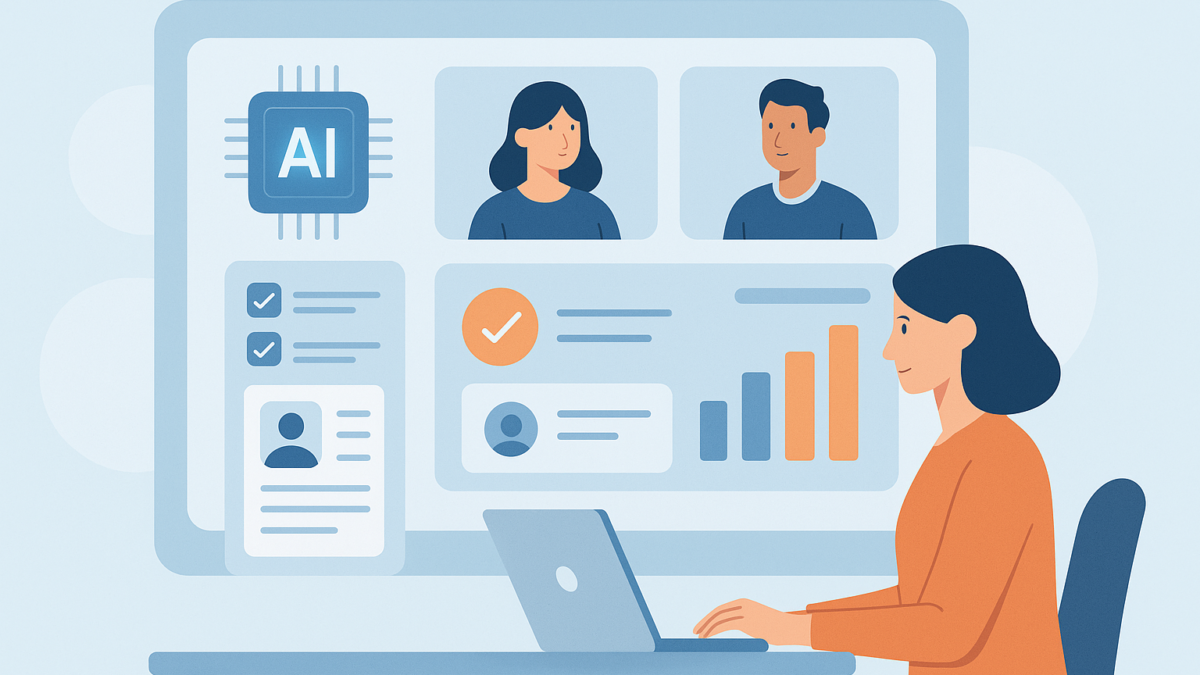AI in Hiring: How Smart Tech is Transforming Recruitment in 2025
Table of Contents
Introduction
Hiring the right talent has always been one of the biggest challenges for HR teams. In today’s fast-paced digital world, recruiters are inundated with thousands of applications, tighter deadlines, and growing pressure to hire diverse, qualified candidates. Enter Artificial Intelligence (AI)—a game-changer that’s rapidly reshaping how companies attract, evaluate, and hire talent.
In 2025, AI isn’t just a futuristic tool—it’s a central force behind smart, scalable, and bias-aware hiring. Here’s how it’s transforming the recruitment process from end to end.
What Is AI in Hiring?
AI in hiring refers to the use of machine learning algorithms and natural language processing (NLP) to automate, optimize, and enhance various stages of the recruitment process. This includes:
- Resume screening
- Candidate sourcing
- Interview scheduling
- Video interview analysis
- Job matching
- Predictive analytics
- Onboarding automation
Instead of relying on gut feelings or manual review, companies are now leveraging data-driven insights to make faster, fairer hiring decisions.
Automated Resume Screening
One of the earliest and most popular use cases of AI in hiring is automated resume screening. With applicant tracking systems (ATS) powered by AI, recruiters can quickly filter through thousands of applications, ranking candidates based on job-specific keywords, skills, and experience.
Benefits:
- Saves hours of manual screening time
- Reduces human error and fatigue
- Improves consistency in evaluating applications
Tools like HireVue, Pymetrics, and Hiretual are leading this wave of intelligent resume filtering.
AI-Powered Candidate Sourcing
Finding the right candidates before your competitors do is a strategic advantage. AI sourcing tools scour job boards, professional networks, and even social platforms to identify passive candidates who match your criteria—even before they apply.
Some platforms can predict a candidate’s likelihood to switch jobs or recommend the best outreach time based on online behavior.
Example tools: SeekOut, Entelo, AmazingHiring
Bias Reduction and Inclusive Hiring
One of AI’s most promising roles in HR tech is addressing unconscious bias in hiring. AI tools can anonymize resumes, removing names, genders, and photos to focus only on skills and experience. They can also flag biased language in job descriptions that might unintentionally discourage diverse candidates from applying.
That said, AI is not perfect—it must be trained on diverse, representative datasets to avoid reinforcing existing biases.
Video Interview Analysis
AI-driven video interviewing platforms go beyond facial expressions. They analyze:
- Speech patterns
- Word choice
- Body language
- Eye movement
This data is used to assess communication skills, cultural fit, and even cognitive abilities. Some platforms can rank candidates after video interviews, helping recruiters prioritize follow-ups.
While this technology is efficient, it does raise questions around privacy, ethics, and accuracy, making human oversight essential.
Predictive Hiring and Talent Matching
AI can predict which candidates are most likely to succeed based on historical data. For example, if top performers in your sales team share certain traits or experience levels, AI can identify similar attributes in new applicants.
This goes hand-in-hand with job matching engines that pair applicants with open roles based on not just what they’ve done—but what they’re likely to excel in.
Improved Candidate Experience
AI chatbots and virtual assistants provide 24/7 interaction with candidates, answering questions, scheduling interviews, and keeping applicants informed at every stage. This enhances the candidate experience, improves your employer brand, and reduces drop-offs during long hiring cycles.
Tools like Paradox (Olivia) and Mya offer conversational AI for high-volume recruiting.
Benefits of AI in Hiring
- Faster time-to-hire
- Lower cost-per-hire
- Improved quality of candidates
- Scalable hiring for enterprise needs
- Enhanced diversity & inclusion efforts
- Better candidate experience
Challenges & Considerations
- Bias in Training Data – AI is only as fair as the data it learns from
- Transparency – Many algorithms are black boxes with unclear logic
- Over-reliance – AI should assist, not replace, human judgment
- Privacy Regulations – Tools must comply with GDPR, EEOC, and local labor laws
The most effective AI hiring strategies involve a human + machine collaboration—where AI handles the grunt work, and recruiters focus on connection, empathy, and strategy.
The Future of AI in Recruitment
Looking ahead, AI in hiring will evolve from automation to augmentation. Expect to see:
- AI that learns your team culture to recommend culture-fit candidates
- Voice-based application systems integrated with smart devices
- Emotionally intelligent AI that adapts communication styles to candidates
- Deep integrations between recruitment and performance management platforms
Final Thoughts
AI is no longer a buzzword in HR—it’s a necessity. As the war for talent intensifies, companies that adopt AI-powered hiring tools will not only find better candidates faster but also build fairer, more inclusive workplaces.
But like any technology, AI is only as effective as the strategy behind it. The future of hiring isn’t just AI-driven—it’s AI-empowered, human-led.
Want to stay ahead in the HR tech race?
Subscribe to HRTechMunch.com for more insights on how AI, automation, and analytics are transforming the future of work.
You May Also Like: The Future of HR Tech: Trends Reshaping the Workplace in 2025 and Beyond





